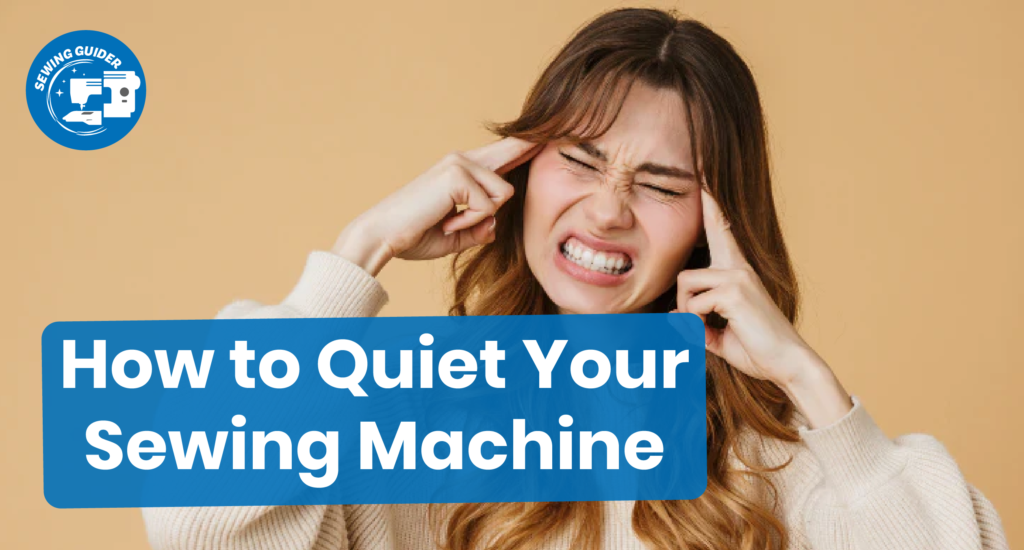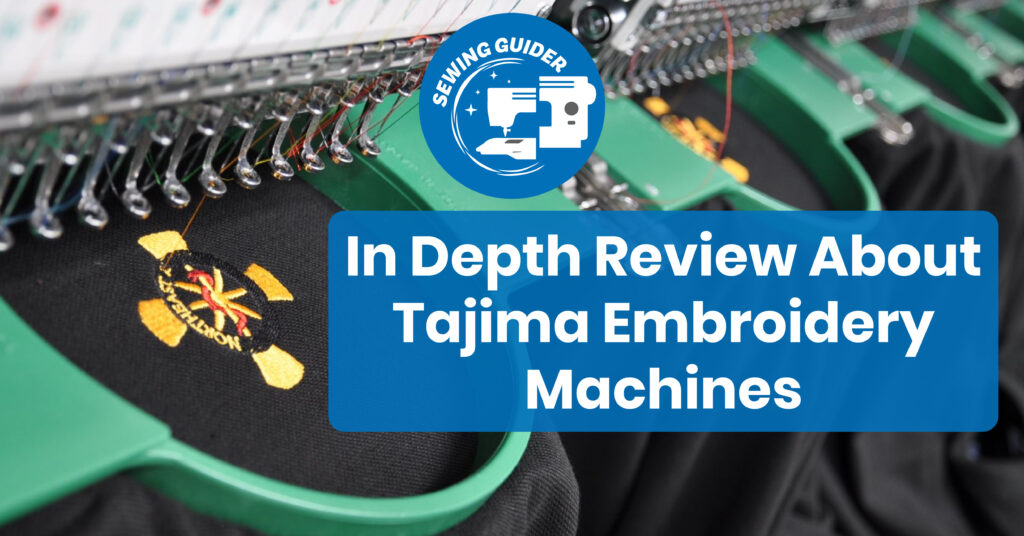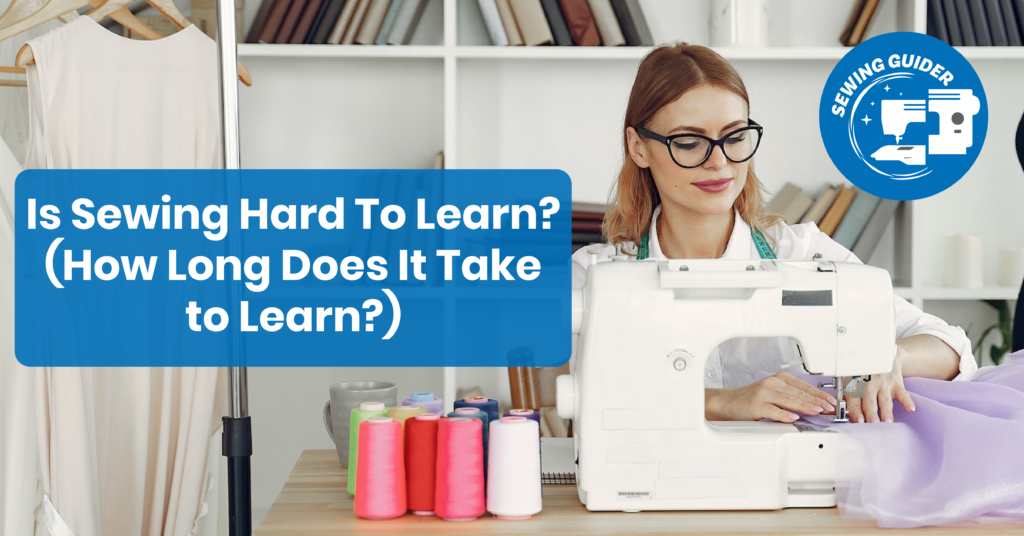Are you disturbed by the noise of your sewing machine? There are many practical ways to quieten a noisy sewing machine. This article will cover Best 10 practical and straightforward tips for “How to Quiet a Sewing Machine?” Let’s get started!
Clean and Lubricate Your Machine:
Lack of lubrication and dust accumulation are two common causes of noisy sewing machines. Clean the bobbin, the feed dogs, and all other components regularly. Apply sewing machine oil as directed in the manual. This will ensure smooth movements and reduce noise generated by friction.
Check for loose parts:
Check your sewing machine to see if there are any loose nuts or bolts. Over time, vibrations can loosen parts of the machine and cause increased noise. To stabilize the machine, tighten any loose components gently.
Select the Right Thread and Needle:
The wrong needle or thread can increase the noise of the machine. Consult your manual to find the needle and thread sizes recommended for different fabrics. The right combination of needle and thread will reduce noise when sewing.
Place the machine on a stable surface:
Noise levels can be affected by the surface your sewing machine is placed on. Make sure your work surface or sewing table is sturdy and stable. Place a rubber mat under the machine. This will absorb vibrations and reduce sound transmission.
Replace worn-out parts:
Some parts, like the belt and gears, may wear out as your sewing machine ages. This can lead to an increase in noise. Consult your manual or call a professional if you notice signs of wear.
Thread tension can be adjusted:
A noisy machine can be caused by incorrect thread tension. Try adjusting the tension of the thread to find the best setting for your fabric. The correct tension will reduce noise and improve the quality of your stitches.
Install noise-dampening pads:
Add sound-dampening foam or pads to the interior of your machine. This will absorb vibrations and reduce noise. You can find noise-reducing products at your sewing machine manufacturer or from specialized retailers.
Upgrade to a quieter model:
It may be time to upgrade your older sewing machine if it is consistently noisy, despite you trying different solutions. Modern sewing machines are often equipped with noise-reducing features that make sewing quieter.
Sew at Maximum Speed:
Sewing too fast can create more noise. Adjust your sewing speed to one that is both comfortable and quiet while maintaining the efficiency of your projects.
Regular Maintenance:
Remember that regular maintenance will ensure a quiet sewing machine that works well. To keep your machine running smoothly, schedule periodic service and checkups with a professional.
Why is your sewing machine too noisy?
Sewing machines may become noisy due to a variety of reasons. These can vary depending on the type, age, and usage. Here are a few common factors that can cause excessive noise.
Lack of Lubrication:
The moving parts can wear out over time, causing friction and noise. Regular lubrication will ensure smooth operation and reduce noise.
Loose Parts:
Vibrations caused by the sewing machine may cause screws, nuts, or other components to become loose. It can cause rattling sounds during sewing.
Wear-out parts:
Certain parts, such as the motor, belt, or gears, can become worn out with age, increasing noise levels.
Use the wrong needle and thread:
The machine can be overworked and noisy if you use the wrong size of thread or needle for the fabric. For a quieter experience, choosing the right threads and needles for your fabric is essential.
Surface Unstable:
Placing your sewing machine on an unstable or uneven surface can increase vibrations and noise.
Conclusion:
A noisy machine can distract you from your sewing and frustrate you. Understanding the reasons behind excessive noise and taking practical steps to quieten your machine will allow you to enjoy a more focused and peaceful sewing session. Regular maintenance, balance, and a soundproof environment are essential to a more pleasant and quieter sewing experience. Happy sewing!
Frequently Asked Questions
Why Is My Sewing Machine Making So Much Noise?
There are several reasons why your sewing machine might be making excessive noise. Some common causes include lack of lubrication, loose parts, worn-out components, using the wrong needle or thread, and sewing at high speeds. Regular maintenance and proper use can help reduce the noise.
Can I Use Any Type of Oil to Lubricate My Sewing Machine?
No, it’s essential to use sewing machine oil specifically designed for sewing machines. Avoid using household oils, as they may not be suitable for the machine’s internal components and could cause damage.
How Often Should I Clean and Lubricate My Sewing Machine?
Cleaning and lubrication frequency depends on the frequency of use and the type of projects you undertake. As a general rule, it’s best to clean and lubricate your sewing machine after every major project or at least once a month for regular use.
Can I Fix a Noisy Sewing Machine by Tightening Loose Screws Myself?
Yes, you can try tightening loose screws gently to stabilize the machine and reduce rattling noises. However, if you’re unsure or if the problem persists, it’s best to consult a professional sewing machine technician.
Will Investing in a More Expensive Sewing Machine Make It Quieter?
Not necessarily. While some higher-end sewing machines may come with noise-reduction features, the noise level also depends on how well you maintain and use the machine. Proper maintenance, thread and needle selection, and a stable work surface are essential regardless of the machine’s price.
How Can I Soundproof My Sewing Area Without Spending Much?
You can create a budget-friendly soundproof sewing area by using noise-dampening pads or foam inside the sewing machine, placing rubber mats under the machine, and using thick curtains or blankets as makeshift soundproofing materials.
My Sewing Machine Is Still Noisy Despite Trying Various Solutions. What Should I Do?
If you’ve tried all the tips mentioned and your sewing machine remains excessively noisy, it might be time to have it professionally inspected and serviced. A sewing machine technician can diagnose any underlying issues and provide necessary repairs or replacements.
Can I Sew at High Speeds Without Generating Much Noise?
Sewing at high speeds can increase noise levels. To reduce noise, try adjusting your sewing pace to a comfortable and steady speed that still allows for efficient stitching.
How Important Is It to Have a Stable Sewing Surface?
A stable sewing surface is crucial in reducing vibrations and noise. Using a sewing table or cabinet designed to absorb vibrations can greatly enhance the quietness of your sewing machine.
Is It Worth Upgrading to a New Sewing Machine to Reduce Noise?
Upgrading to a newer sewing machine with noise-reduction features can be a worthwhile investment if your current machine consistently produces excessive noise despite regular maintenance and adjustments. Consider researching and testing out different models before making a decision.





